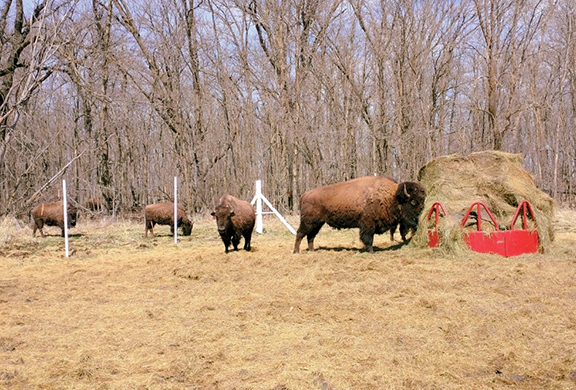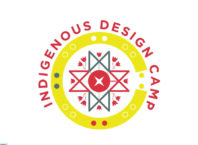
By Lee Egerstrom
Northern Minnesota tribes have expanded their investments and roles in providing food security for their communities and in providing education and training for skilled 21st Century jobs for the future.
In a flurry of activity announced in November and late October, tribal business leaders stressed these actions provide security for local, sustainable foods as well as security for jobs in their communities.
The largest such move was the acquisition of the former Teal’s Market in Cass Lake by the Leech Lake Band of Ojibwe. In late October, the Band took position and reopened the supermarket under the name Leech Lake Market.
The Teal family, originally from International Falls, had operated the Cass Lake store since the 1940s. It continues to run a family-owned grocery chain in various communities of Minnesota, North and South Dakota.
Store manager Jay Hinkemeyer told The Circle that the transition was smooth. “Everyone stayed in place,” he said of the nearly 80 employees at the store. “So far, it has been a real smooth transfer.”
Leech Lake’s tribal council has a goal of expanding business activity beyond gaming. LLBO Chairman Faron Jackson Sr. told the Leech Lake News for an Oct. 15 article, “The purchase of Teal’s is a milestone in the assurance of food sovereignty for the Band as well as continuing diversification of the businesses the Band owns and operates.”
Leech Lake has other tribal businesses that include Northern Lights Express, a gas and convenience store at Walker; Che We Supply, an office supply business at Cass Lake; and Ojibwe Wild Rice, based at Cass Lake that processes and markets natural, hand-harvested wild rice for Leech Lake members.
Several similar steps were taken by the Red Lake Band of Chippewa to diversify and strengthen food sovereignty and jobs.
Red Lake Inc., the economic development corporation for the Red Lake Nation, announced in early November that it had purchased KC’s Best Wild Rice, a privately-owned wild rice company from nearby Bemidji.
The company, founded by Kent Bahr in 1994, sells northern Minnesota and Canadian wild rice products both online and direct to grocery stores, restaurants and gift shops, the announcement said. This acquisition is an expansion of Red Lake’s own enterprises and becomes the first tribal business operating outside the Red Lake Nation.
“That he (Bahr) chose us to carry on the tradition of the company he so carefully built over the years is a testament to how far we’ve come,” Charles Dolson, chief executive of Red Lake Inc. said in a statement. “It is truly an honor. We intend to build on his legacy of quality and service for decades to come.”
Products include Minnesota cultivated long grain wild rice, instant, canned cooked and wood parched wild rice. Also, the KC line includes hand-harvested wild rice from Ojibwe people in the region as well as Canadian lake airboat harvested natural wild rice.
It is a natural fit with Red Lake Foods and Farms, a longer established business of Red Lake Inc. that does business as Ogaakaaning Enterprises for the Red Lake Nation. Its holdings also include Red Lake Propane, Red Lake Retail, Ponemah Market, Red Lake C-Store, Red Lake Builders and Red Lake Fisheries and a Subway restaurant, a fireworks retail business, Red Lake Government Contract Services and Ogaakaaning Realty.
Along another path that combines Native food and culture with environmental preservation, the Red Lake Nation released a YouTube video in November showing progress it is making in establishing Mashkode Bizhikiwag, or the Red Lake Bison Ranch and Hemp Farms. It can be accessed online at https://youtube.com/watch?v=
OGSdf37iCPg.
A spokesman explains for non-Ojibwe speakers that the name essentially means buffalo or bison, literally “prairie cow,” and that adding “wag” to Bizhiki makes it plural.
Red Lake and its allies are indeed making it plural.
The video shows how the operation started with help from South Dakota tribal friends with seven buffalo in 2020. Fifteen more were added in the past year. “You can’t be sovereign unless you feed your own people,” Cherilyn Spears, Red Lake Economic Development Project Coordinator, explains in the video. She calls the return of the buffalo as a “lifeline for our people to have good and healthy food.”
It is a restoration project to bring back bison to their Red Lake area natural habitat. Ed Iron Cloud III, from Porcupine, S.D. on the Pine Ridge reservation, explains how the project has progressed and Dell Perkins, a Red Lake agricultural specialist, stresses the importance of both restoring the animals and a sustainable tribal food source.
While these food related investments shore up tribal businesses with Ojibwe culture and the past, another major Northland project will help position people for evolving jobs of the future.
Wells Technology in Bemidji, a sophisticated designer and maker of computer controlled manufacturing tools and equipment, opened a training program in early November at the Oshkiimaajitahdah (“new beginning”) Center in Redby, on the Red Lake reservation.
The Redby program is an initial step in a vocational training program run by the Wells Academy in Bemidji, a Native American machinists training branch of Wells Technology.
Students are at the same time apprentices and are paid during their training. In the process, they learn to operate computer controlled manufacturing machines, known in industry as Computer Numerical Control (CNC) machines.
CNC machines replace a lot of human involvement in manufacturing. But sophisticated, trained workers oversee the automated manufacturing process.
Andrew (Andy) Wells III, an enrolled member of the Red Lake Band, started Wells Technology in 1985. He continues as president and chief executive officer (CEO).
The company expanded along the way to provide design and manufacturing equipment for other companies that provide maintenance, repair and operating (MRO) tools and equipment for its customers, and for original equipment manufacturers (OEM) customers.
Industry information describe the latter as makers of systems or components used in another company’s product. An example would be computer manufacturers who combine processors and software, for instance, into the systems and products they sell.
Among especially timely Wells Technology products are solar tracking equipment for solar panels. Solar panels become up to 35 percent more productive when moving with the sun during daylight. Wells products are designed to serve the Defense, aerospace, automotive, electronic, medical and food industries.
Several members of the Wells family are involved in the family-owned company. They include Andy Wells IV as chief financial officer (CFO).
In an article distributed for the Red Lake Nation, the senior Wells said Oshkiimaajitahdah students will get advance training at the Wells Academy site at Bemidji. The year-long training “will assist students in securing full-time employment in the industry of their choice, and hopefully, many will want to stay at Wells Technology where many jobs are open and employees are needed,” he said.






